Six Nations 2017: Scotland defy the natural order to down Ireland
- Published
Ronan O'Gara was irked. You could tell by the look of him, as he sat in the RTE studio in Dublin before kick-off, sounding-off about the Scots, external and what he would like Ireland to do to them. "I hope we hammer them," he said. "Too mouthy, but they can't back it up."
Where exactly O'Gara was getting the 'too mouthy' thing from is unclear - in his playing days Munster were not above inventing slights from the opposition just to get themselves angry - but the former Ireland fly-half had a bit of an irony bypass in that moment. Mouthiness was always part of O'Gara's make-up, one of the things that made him a terrific player. Pot met kettle and together they came up with a line that was embarrassingly wide of the mark. Whatever 'it' was in O'Gara's head, Scotland most definitely backed it up. Famously and unforgettably.
This was a day when Scottish nerves were toyed with, a day when the heart threatened to jump out the chest such was the drama on the field. From the low of the opening minutes when Scotland's scrum came under heavy, penalty-laden fire, to the high of that first score from Stuart Hogg, it was an epic contest.
Scotland defended brilliantly, chaotically, passionately. And they were clinical. They took their chances and Ireland didn't. Their points-to-possession ratio was incredible. The Scots have become ruthless - and it's a revelation.
For many years Scotland have tormented themselves with their inability to convert chances. It's been painful. Almost two decades of fingernails being dragged down a blackboard. Before Vern Cotter turned up and changed things you could have polled the Scottish fans about what they expected to see first - (a) the whereabouts of Cleopatra's tomb (b) the location of the Ark of the Covenant or (c) the creation of a slick Scottish attack and most would have gone for (a) or (b) but never (c).
The soft touch years look to be over. Maybe that was part of what bothered O'Gara. He rarely griped when Scotland turned up and lost. Scotland were patronised half to death in those days. They won ball, they attacked, they created chances and they never took them. And they lost. And lost. And lost.
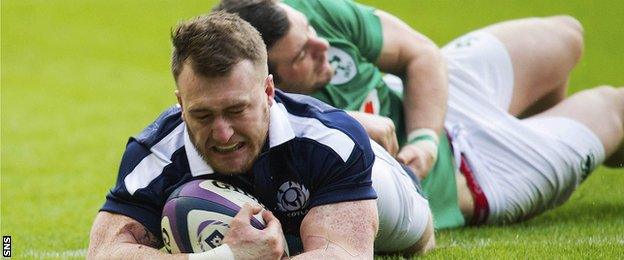
Hogg's two first-half tries set Scotland on the road to victory
Now they know how to win. Patience and precision for the first try, a great Zander Fagerson turnover and a superb lineout take from Richie Gray in the lead-up to the second.
And the third was rugby's equivalent of a three-card trick. Glorious subterfuge. Two years ago, in the final day mauling that saw Ireland win a second straight Six Nations title, Joe Schmidt's team worked a clever play off a lineout that brought a try for Sean O'Brien. Scotland were susceptible to sucker punches back then. They're more streetwise now. There's a canniness in the team that hasn't been there since 1999, the year they last won the championship. Fagerson was three years old at the time.
It wasn't just five points that Ireland lost with that Alex Dunbar try off the lineout, it was a bit of professional pride. The great conquerors of New Zealand in Chicago had been out-foxed. The master had been schooled.
Jonny Gray is a great case study in all of this. The 22-year-old has a head full of memories of watching Scotland on days like Saturday. As a boy, he never saw his country win a Grand Slam and can't remember them ever being contenders. He'd only just turned five when they last won a championship. He was still in primary school when they last won three games in the Six Nations.
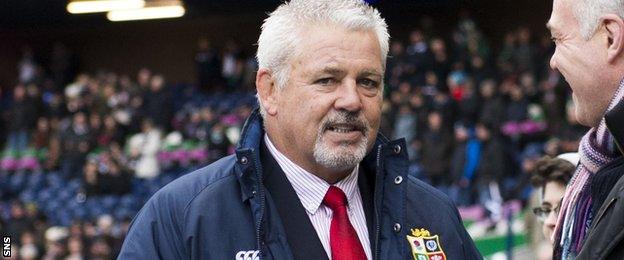
British and Irish Lions head coach Warren Gatland was in attendance as several Scotland players impressed
Other 22-year-olds from Ireland, Wales, England and France could regale you with stories of how they were inspired to play the game after seeing their national heroes win silverware. Garry Ringrose, the Irish centre, is the same age as Gray, but has seen his country win a Slam and two Six Nations titles and his province win three European Cups.
Gray has had none of that. On his route to the top he's witnessed wooden spoons and despair. Having failed to watch history as a kid, he's now trying to create it as a man.
The second-row made 27 tackles and carried 14 times in this seismic victory over Ireland, but, as good as he was, let's not make this all about Gray when this win was about all of them. The bare statistics are sharp enough to take your eye out. Scotland ceded 58% possession and 62% territory to Ireland on Saturday and in the process they had to make 242 tackles.
That's such a stratospherically high number that it's hard to get the head around. Maybe once every championship, or every other championship, a team (Italy) might make 200 tackles in a match, but they always get hammered. Last season Italy had to made 200 against Ireland but they lost 58-15. The year before they made 245 against Ireland and lost 46-7. Teams don't tend to make that amount of tackles and win. It's not supposed to happen. It defies the natural order.

Jonny Gray is congratulated by Vern Cotter on a display that featured 27 tackles and 14 carries
That's what happened at Murrayfield, though. Gray with his 27 tackles, his relentless big brother, Richie, with 23, the outstanding Hamish Watson with 19 despite playing for only 48 minutes, Ross Ford also with 19 even though he didn't start the game. Ryan Wilson's work-rate was phenomenal and he made 17 tackles, so did the non-stop Fagerson, so did Dunbar. Josh Strauss had 16. Allan Dell got targeted in the scrum but he made 14 tackles.
The numbers were ridiculous. Of the game's top-10 tacklers, nine of them were Scottish. That's an illustration of the pressure the home team was under and a glowing tribute to the steel that made the win possible.
This was not the Ireland of the autumn. The elan of Chicago and Dublin in November didn't make it to Edinburgh in February. This was a step back a few years when Ireland, under Joe Schmidt, sought to win by attrition, by bullying opponents into submission.
What made it a thriller was the Scottish suffering, the fear of it all going wrong again and the brilliance of the endgame. When Paddy Jackson stretched for the line and scored the try and then kicked the conversion that put Ireland ahead with 17 minutes left on the clock a silence fell over the stadium, save for the celebrating Irish.
Ireland coach Joe Schmidt rues a number of missed second-half chances
There were replays of Jackson's score on the big screens but the more haunting flashbacks for the Scots would have been the memory of those late, late losses against Australia in the autumn of last year and at the World Cup the year before and the Six Nations sickeners at Italy's hand in 2015 and against France in 2014. All in the last minutes, all the detail burned into the soul of the Scottish rugby people as if applied with a branding iron.
With a dozen minutes left to play, Ireland's sharks were circling the waters again, still making errors, still playing a conservative game of battering ram and not a lot else but looking to all the world that they would get the try that would have completed the kill. They had seemingly overcome Scotland's rapier thrusts in the opening half. They had apparently got a handle on their own deficiencies, of which there were many.
Scotland lifted one siege, through John Barclay, then coughed up lineout ball and promptly lifted another. Like a fighter coming off the ropes, the Scots moved downfield, put a penalty to touch, stayed cool and accurate and got their noses back in front.
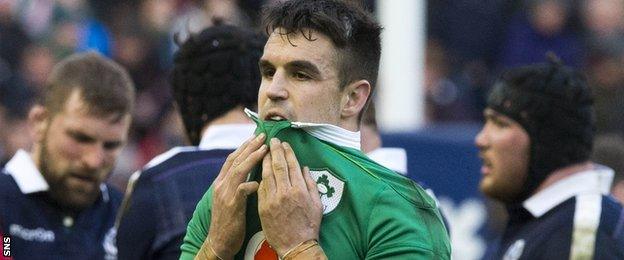
Conor Murray is left frustrated as Scotland repel another Ireland attack
On 75 minutes, CJ Stander got the ball in his hands again. He had carried more than 20 times by that point and here he was carrying again, hoping to take his team in range for a penalty or a drop-goal that would rescue things. Stander had barely got up a head of steam when he was battered by a double hit from Gordon Reid and Wilson.
The number eight spilled it forward. The sight of Stander coughing up ball is like Kryptonite to Ireland's confidence. Scotland fed off it. They went down the other end, waited for Ireland to lose their head and then punished them with that last penalty. Greig Laidlaw put it over and then spread his arms out wide in celebration of the final whistle.
On a day that threw up so many memorable images, the one of Laidlaw drinking in the noise of the crowd stood out. So did a late night tweet from O'Gara. "Congratulations. Well deserved. Better team won." On that, there can be no argument.
- Published4 February 2017
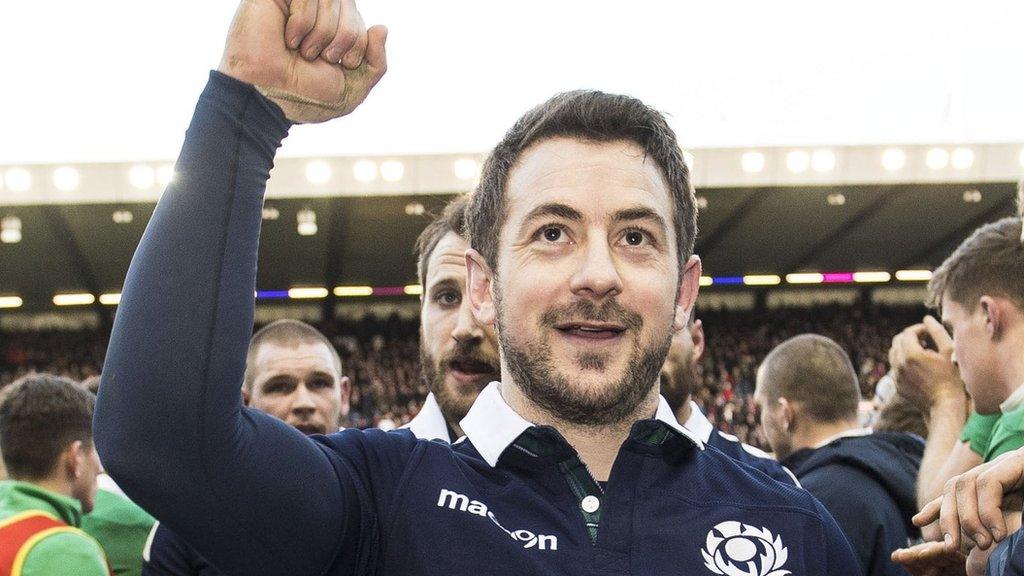
- Published4 February 2017
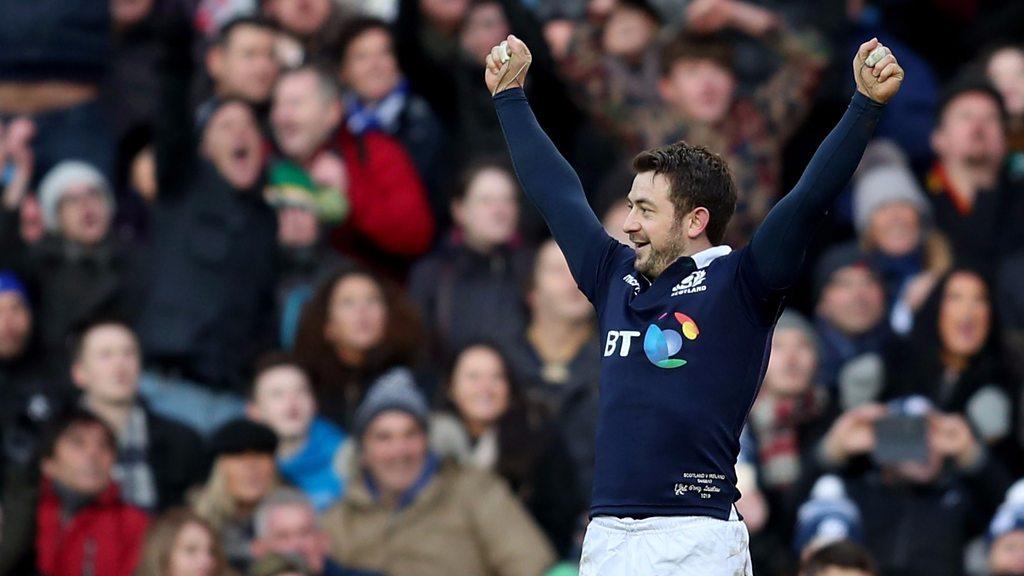
- Published4 February 2017
